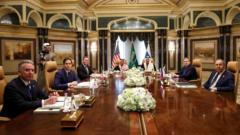Amidst the ongoing conflict in Gaza, Egypt’s President Abdul Fattah al-Sisi faces a critical diplomatic challenge as he engages in negotiations with Hamas to sustain a fragile ceasefire. Cairo is inundated with Gazans who fled the violence, yet a sense of anxiety prevails among them regarding their families still trapped in the war-torn region. American President Trump has stirred discontent with his recent proposal, which suggests displacing two million Palestinians to create a new territory in Egypt and Jordan, deeply alarming many Egyptians who perceive this as a threat to their sovereignty and stability.
**Gaza Conflict Strains Egypt's Ties with the U.S. Amid Hamas Negotiations**

**Gaza Conflict Strains Egypt's Ties with the U.S. Amid Hamas Negotiations**
In the backdrop of escalating tensions in Gaza, Egypt grapples with its foreign relations, particularly with the United States, as President Trump proposes controversial solutions for the Palestinian crisis.
The relationship between Egypt and the U.S. is complex; historically, the partnership, cemented by a peace treaty with Israel, has involved substantial U.S. military aid. However, the current atmosphere has triggered significant criticism within Egypt, where commentators have openly denounced the U.S. stance and the administration's plans for Gaza, insisting that Egyptians will oppose any perceived coercion. President Sisi has been cautious, opting not to visit Washington while the controversial displacement idea looms over negotiations.
To counter the U.S. narrative, Egypt is proactively working on its masterplan for Gaza's reconstruction that focuses on providing shelter for Gazans within their homeland instead of facilitating their relocation. Influential figures in Egypt have proposed significant investment for rebuilding efforts, presenting innovative solutions to restore Gaza without mass displacements.
As regional discussions unfold, Egypt's importance as a mediator remains vital. However, relations with the U.S. could undergo profound changes based on how the conflict unfolds and the viability of proposed peace initiatives.
Egyptians find themselves divided on the issue, with strong sentiments emerging against the idea of assimilation of more refugees into their country. Many argue that a continued Palestinian presence in Gaza is essential for their own statehood aspirations, voicing a common determination to resist external pressures while securing their national interests. The perception that Egypt could become a sanctuary for Hamas fighters and intensify domestic unrest looms heavy, confronting the government with the need to navigate this geopolitical crisis effectively.
To counter the U.S. narrative, Egypt is proactively working on its masterplan for Gaza's reconstruction that focuses on providing shelter for Gazans within their homeland instead of facilitating their relocation. Influential figures in Egypt have proposed significant investment for rebuilding efforts, presenting innovative solutions to restore Gaza without mass displacements.
As regional discussions unfold, Egypt's importance as a mediator remains vital. However, relations with the U.S. could undergo profound changes based on how the conflict unfolds and the viability of proposed peace initiatives.
Egyptians find themselves divided on the issue, with strong sentiments emerging against the idea of assimilation of more refugees into their country. Many argue that a continued Palestinian presence in Gaza is essential for their own statehood aspirations, voicing a common determination to resist external pressures while securing their national interests. The perception that Egypt could become a sanctuary for Hamas fighters and intensify domestic unrest looms heavy, confronting the government with the need to navigate this geopolitical crisis effectively.




















